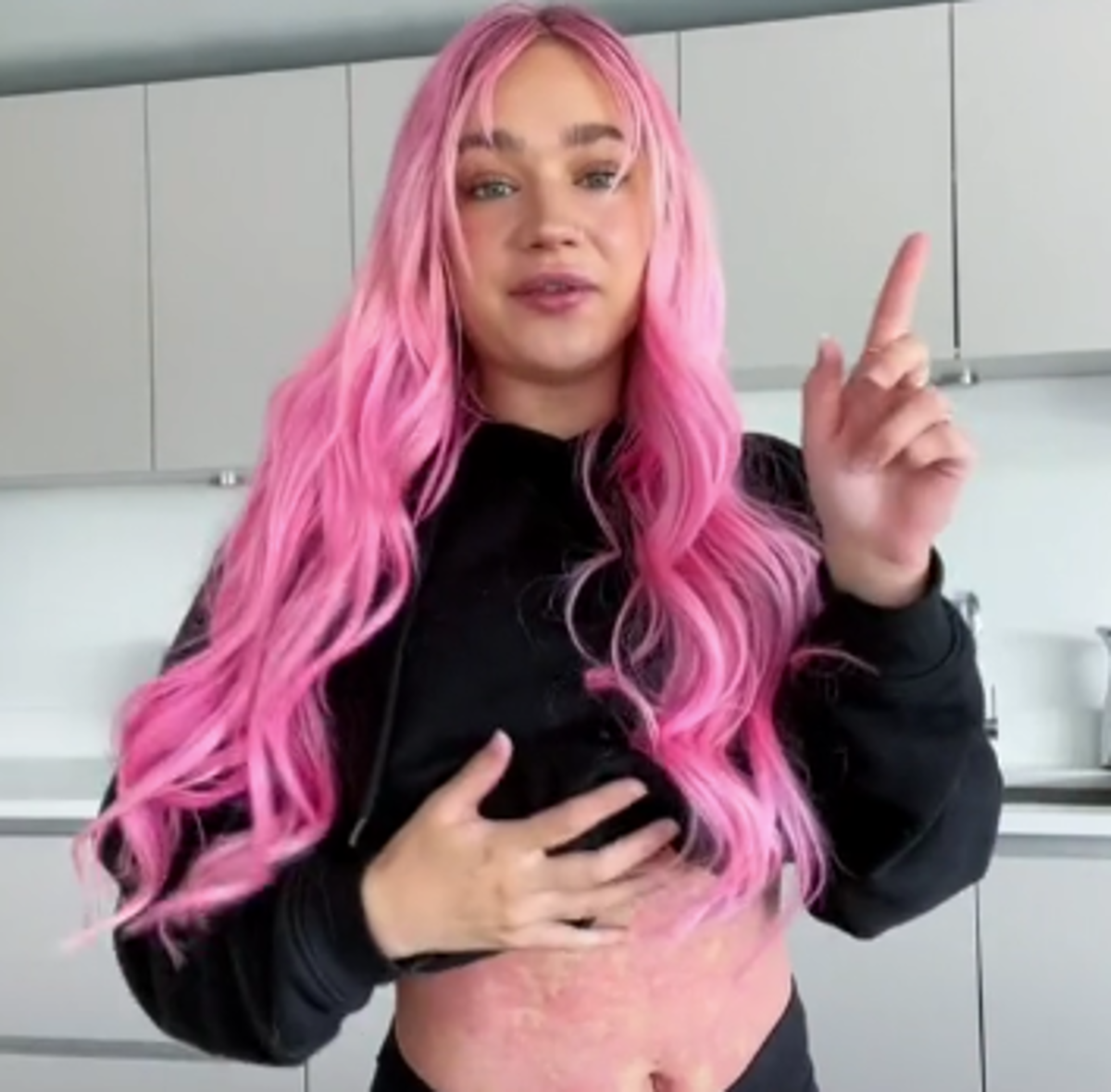A TikTok Star's Psoriasis Story
- Rosie Daniels, who has more than 4.4 million followers with her boyfriend on TikTok, isn’t shy to talk about her struggle with psoriasis and hopes to spread the word on how the condition is actually pretty common.
- Psoriasis, a hereditary chronic skin condition, can be treated with many different approaches like topical ointments or injectable therapies but there is no cure.
- Common symptoms of psoriasis are a rash on the skin, or unsightly scabs and scales.
In regards to why she’s making an effort to tell others about her psoriasis battle, the pink-haired influencer told Yahoo Life, “This is my chance to do as much as I can to try and spread the word about how common this condition is.” Rosie, who posts on her TikTok page with her boyfriend Harry, continued, “We share a lot about just our general life, so obviously, I thought it was a major part of my life. So I’m going to share this online.”
Read More
She recalls the patches on her stomach being “really small, like literally the size of a coin” and thinking nothing of it, hoping they would disappear. However, the patches worsened. “My skin has slightly cleared a little bit as to what it was, but around six months ago, my skin was at its absolute worst and it covered around 90% of my body,” she explained.
“I’ve tried different diets. I’ve tried different supplements. I’ve tried Chinese herbal medicine. I’ve spent thousands upon thousands of pounds on trying to find different treatments that will work for me and be the healthiest, but I haven’t actually found anything that’s 100% cleared my skin.”
Sometimes her psoriasis causes her body to feel like it’s burning, a similar feeling to sunburn that doesn’t allow her to lay down sometimes due to the intense pain. And flare-ups of the condition can make movements like bending down to tie her shoes difficult as her skin feels like it’s being “ripped apart.”
Despite telling her story to millions of people, Rosie insists she’s “never received hate because of my skin.” She praises her and Harry’s fans as being extremely supportive, adding, “I never even have the words to explain how much I appreciate how supportive everyone online has been toward me.”

Understanding Psoriasis
Psoriasis is a skin condition that causes red, itchy patches to develop on the skin. It is a chronic disease, which means that it does not have a cure. Fortunately, symptoms can often by managed with different treatments and, for some, even lifestyle adjustments. The disease is rare; only about 3.2% of the U.S. population has it, according to the American Academy of Dermatology. Still, there have been major developments when it comes to treating psoriasis in recent years.
"Psoriasis is a chronic, auto-immune skin condition where you have red, scaly patches on the skin," Dr. Saakshi Khattri, a dermatologist/rheumatologist at Mount Sinai Health System, tells SurvivorNet. "It is a chronic condition, which can ebb and flow. You can have good days and bad days."
Dr. Saakshi notes that while anyone can develop psoriasis, the disease is more common in people between the ages of 30 and 50. Researchers believe genetics, as well as environmental factors, may play a role in the development of psoriasis.
Learning to Live With Psoriasis Opening Up to Overcome Stress & Shame
Dr. George Han, a dermatologist at Northwell Health/Lenox Hill Hospital, tells SurvivorNet that psoriasis is also connected with many internal comorbidities. "The most obvious of which is psoriatic arthritis, which is an inflammatory arthritis that if left untreated is debilitating…as well as a number of other comorbidities that we're learning more and more about, such as inflammatory bowel disease, metabolic syndrome. So there's a lot of different connections, also with psychiatric comorbidities."
What are the Symptoms of Psoriasis?
Psoriasis is often asymptomatic, so people who have the disease will not be dealing with constant outbreaks.
"Some patients report itching [or a] burning sensation, but that doesn't tend to be the norm. It certainly can happen," Dr. Khattri explains. "Then if you have psoriasis in the genital area, it can feel uncomfortable just because it's in a very sensitive part of the body. But for the most part, it tends to be asymptomatic."
Systemic Treatment Options for Psoriasis Target Triggers Within the Body to Alleviate Symptoms
Dr. Han says he sees many patients with itching. "It's interesting because if you look at the older dermatology textbooks, there was this concept that psoriasis is not supposed to itch. And so they made this distinction between the itchy rash, which is eczema dermatitis and psoriasis, which is supposed to be not itchy," Dr. Han says. "But if you actually ask patients and in some of the literature now, upwards of 80, 90% of patients do have itching associated with psoriasis."
Symptoms associated with the disease include:
- Red patches of skin covered with silvery scales
- Small scaling spots
- Dry, cracked skin that may bleed or itch
- Itching, burning, or soreness
- Thickened or ridged nails
- Swollen or stiff joints
Dr. Khattri suggests seeing a dermatologist if you notice red, scaly spots on the body so a doctor can make a proper diagnosis. Psoriasis patches can vary in how they appear on the skin. The disease may present as just a few spots with dandruff-like scaling or as rashes that cover large parts of the body. The most commonly affected areas are the lower back, elbows, knees, legs, soles of feet, scalp, face, and palms.
According to Dr. Han, most types of psoriasis can be diagnosed clinically, meaning the doctor can determine psoriasis on sight. With more atypical forms of psoriasis, a biopsy may be needed.
What is Psoriasis? Understanding the Different Types and Symptoms of This Rare Skin Condition
Contributing: SurvivorNet Staff
Learn more about SurvivorNet's rigorous medical review process.


